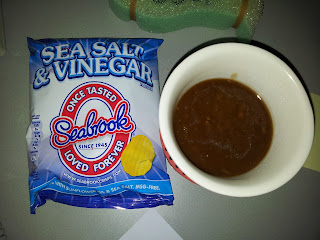We have the soup in it's cauldron.
The observer cannot know whether or not the soup is tasty, and consequently, cannot know whether it is worth buying. Since we cannot know, according to quantum law, the soup is both amazing and awful, in what is called a souperposition™ of states. It is only when we purchase a soup and learn the condition of it's taste that the souperposition™ is lost, and the soup becomes one or the other (amazing or awful). This situation is sometimes called runny food indeterminacy or the customer's paradox: the observation or measurement itself affects an outcome, so that the outcome as such does not exist unless the measurement is made. (That is, there is no single outcome unless it is observed.)
Todays soup is amazing, by the way.
Out of 11
Days since "the spillage" and I've still not cleaned my keyboard: 24
The observer cannot know whether or not the soup is tasty, and consequently, cannot know whether it is worth buying. Since we cannot know, according to quantum law, the soup is both amazing and awful, in what is called a souperposition™ of states. It is only when we purchase a soup and learn the condition of it's taste that the souperposition™ is lost, and the soup becomes one or the other (amazing or awful). This situation is sometimes called runny food indeterminacy or the customer's paradox: the observation or measurement itself affects an outcome, so that the outcome as such does not exist unless the measurement is made. (That is, there is no single outcome unless it is observed.)
Todays soup is amazing, by the way.
Out of 11
- Taste: 9.5
- Texture: 8
- Bouquet/Aroma: 8
- Heat - Temp: 7
- Heat - Chilli: 6
- Brownness: 8
- Beef content: 7
Days since "the spillage" and I've still not cleaned my keyboard: 24

I would like to propose that this theory, whilst clearly brilliant, is inherently flawed. In all records within living memory, there has never been a recorded incident of Chilli Beef Soup being awful...does this soup operate outside of the known laws of the universe?
ReplyDelete